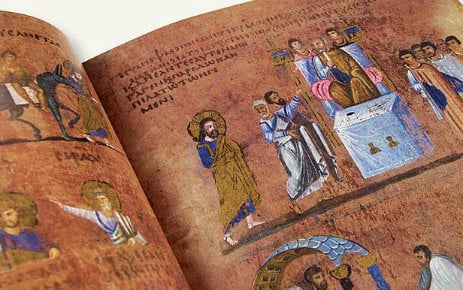The 1600-year-old book, known as the The Codex Purpureus Rossanensis, tells the life of Jesus according to the gospels of Matthew and Mark.
The book features Greek text written in gold and silver ink on dyed parchment and contains a stunning series of biblical episodes illustrated in Byzantine style.
Following a lengthy three-year restoration project in Rome, the codex will now return to its home city to be given a state-of-the-art display.
“The book is the only one of its kind in the world and is of extraordinary historical, artistic and religious significance,” said Anna Russo, a spokesperson for the diocese of Rossano.
“We are expecting many national and international visitors, making the book's exhibition important not just for our town but for the whole of Calabria.”

An illustration shows Jesus arriving into Jerusalem on Palm Sunday. Photo: Michele Abastante/Wikimedia
Inside the book's new high-tech display room, air temperature and humidity will be carefully controlled to stop its fragile pages from disintegrating.
Only 188 of the book's original pages still remain, with the rest having been lost or destroyed over time.
Multimedia installments will tell visitors more about the history of the codex and allow them to explore its detailed illustrations.
Recent studies of the book, which was discovered in Rossano's sacristy in 1876, reveal it was composed in Syria between 400 and 500 AD but little is known of its early history.
The display at the Diocesean Museum of Rossano will open to the public from July 2nd.



 Please whitelist us to continue reading.
Please whitelist us to continue reading.
Member comments